Could non-alcoholic gin ever be as good as the real thing?
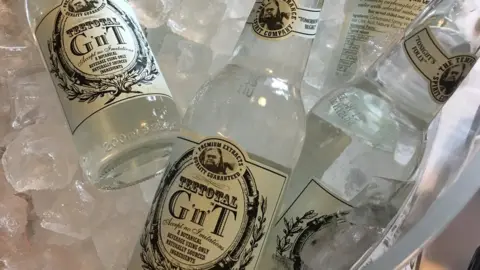 BBC
BBCIt's 13:00 on a Wednesday lunchtime and in the Palace of Westminster, a very lively drinks party is in full swing.
In the gracious surroundings of the wood-panelled Jubilee Room, corks are popped, beer is guzzled and lemons fizz in free-flowing G&Ts.
But despite the prodigious volume of liquid being consumed, there aren't any slurred words or collisions with furniture. That's because, contrary to appearances, no alcohol is actually being drunk.
The event is co-organised by Club Soda, a "mindful drinking movement", and is being held to showcase low and alcohol-free drinks.
The group, which has about 15,000 members, was co-founded by Jussi Tolvi and Laura Willoughby. Jussi still enjoys the odd alcoholic tipple, but Laura is teetotal.
"I gave up drinking six years ago and was stuck with a tonic or a really bad non-alcohol beer," says Laura.
"There is demand for good products, but industry is taking time to catch up. Having said that, big companies like Heineken are spending money on creating a beer that tastes like their full-strength product and to me, this shows that it isn't a fad, it's a market shift."
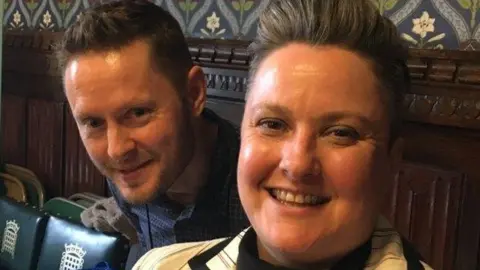
The demand appears to be borne out in the figures. The Office for National Statistics found that in 2016, 20.9% of Brits drank no alcohol, up two percentage points from 2005.
At the same time, CGA, a food and drink data firm, found that for the on-trade - that's restaurants, bars and festivals etc - sales of no and lower alcohol beers, ciders, wines, spirits and mocktails were £232m in 2017. That's up about 3% on the year before.
Among the MPs ploughing their way through booze-free tipples at the drinks event is Fiona Bruce MP, chair of the all-party Parliamentary Group on Alcohol Harm.
"There are some lovely options: prosecco, G&T, ale and lager," she says. "Later, I'm going to be able to go into the chamber of the House of Commons this afternoon and not be in the least bit woozy."
Botanical buzz
Intrigued, I try a "teetotal G&T" from the Temperance Spirit Company. It's sold 500,000 bottles in the last year and is one of a new breed of adult-focused soft drinks.
Served over ice and with a slice of cucumber, it looks the part. But after the first sip, I'm not convinced; it lacks that deliciously dry bite of the real thing.
Company director Gillian Venning encourages me to persevere: "It takes a while for the flavour to come through, but you'll soon start to taste the botanicals."
The juniper does indeed creep up on me and although that warm ginny buzz is missing, it's far more interesting than the lemonades and colas normally on offer for non-drinkers.
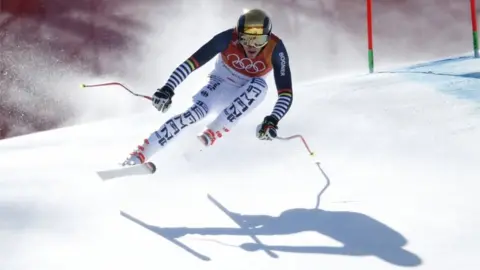 Reuters
ReutersSo why are people drinking less? Jane Peyton, founder of the School of Booze, says there are several reasons: "I recently went to a mindful drinking festival and some people said they weren't drinking because they were pregnant, for others it was religion, but for many it was for health reasons."
Jane's last point chimes with the revelation that during this year's Winter Olympics, German athletes drank gallons of imported non-alcoholic beer.
According to skier Linus Strasser, "It tastes good and it's good for the body. Alcohol-free wheat beer is extremely healthy. It's isotonic. That's why it's good for us sports guys."
'Good karma'
This is music to the ears of Steve Dass, co-founder of Nirvana Brewery. "We're the UK's only alcohol-free brewery," he says.
"It's a holistic movement, we're all vegetarian, we hardly drink, it's about good vibes, good karma and we also have yoga sessions in the brewery."
But do they have good beer? Steve pours me a pint of Karma, a pale ale with an ABV (alcohol by volume) of 0.5%.
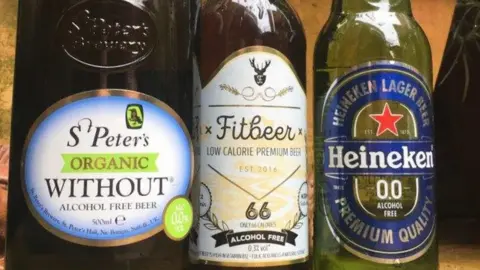
It's billed as "light, refreshing, with classic citrus and floral hop aromas leading to a dry bitter finish".
As a fan of big, flavourful beers, I like the taste, but it doesn't have the all-important body.
Next up is Chakra, "a hopped pale ale with fresh notes of passion fruit, pine & a light bitter finish".
This is more like it. At 1% ABV it drinks more like something akin to 3.5% and I reckon I'd be hard pressed to tell the difference in a blind tasting.
"Not being able to tell the difference" is something The Big Drop Brewing Co's Chocolate Milk Stout has arguably managed to achieve; it won a silver medal in the 2017 World Beer Awards in competition against full-strength rivals.
Delicate and refined
Although beer is one of the most visible parts of the low and no-alcohol market, the sector in general can be hugely innovative.
Zoe Burgess is head of research and development at the Drink Factory, a bar group and consultancy. At a laboratory in East London, she creates both regular and alcohol-free products.
"The key to making good non-alcoholic drinks is to pay as much attention to them as alcoholic drinks, keeping them delicate, refined, using beautiful glasses," she says. "There's no reason they should be treated any differently."
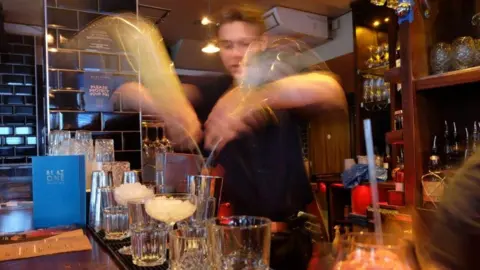
Zoe takes a bag of yellowish liquid from the fridge.
"This is pear shrub syrup. We take whole pears which we slice and cover in caster sugar for a day, add verjus, which is a very delicate vinegar, blend and strain.
"This creates a fine syrup which captures the balance of the pear. We top it up with soda to get that lovely sparkle."
Zoe and her team work with some of the world's most exclusive bars, but non-alcoholic alternatives are also becoming more popular in mainstream outlets. Bar chain Be At One offers nine alcohol-free cocktails.
"In the last 12 to 18 months, we've seen a growth in demand for drinks which are more like cocktails," says area manager Tim Sparrow.
"Customers are coming out with friends or work colleagues, so we're dealing with social experiences as much as the drinks themselves. People don't want to feel as though they're being left out just because they're not drinking."
'More fun'
As a designated driver, TV and radio presenter, Susannah Streeter is often left drinking Virgin Marys and she's keen to try something different, so she joins me in a tasting at the chain's Soho branch. Her verdict is mixed.
First up is the Botanical: Seedlip Garden 108 non-alcoholic spirit plus egg white, apple juice and sugar syrup.
"It's made my eyebrows stand on end! It's got a kick to it and it looks like a champagne cocktail. I also like the glass it's served in."
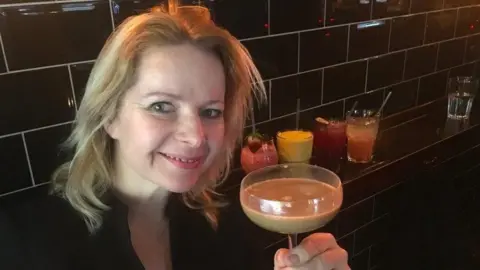
The Passionate Pomme is up next, a blend of passion fruit, manuka honey, pomegranate and coconut water.
"I'm not keen, it's sweet and syrupy, a bit like Ribena."
We finish with a Bean: coffee, cream and almond syrup.
"It's quite substantial and I'd get one as a treat, it's more fun than a lime and soda."
So would Susannah order a non-alcoholic cocktail in a bar?
"Yes, if I'd had enough to drink already or I was driving. The choice is usually really boring, so it's nice to have some options."
